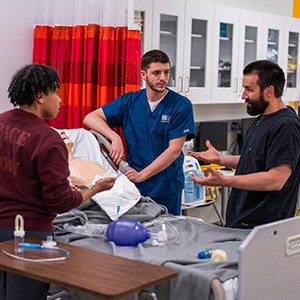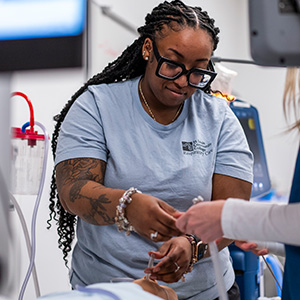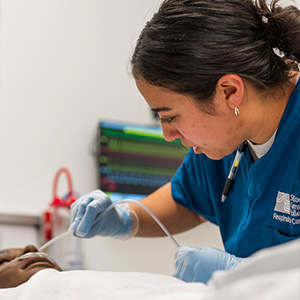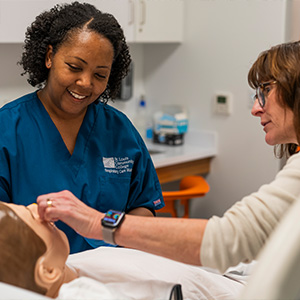Make Every Breath Count with a Respiratory Care Degree
Make a meaningful difference in people’s lives with an associate in applied science (AAS) degree in respiratory care from St. Louis Community College. This high-demand program trains you to care for patients of all ages. STLCC’s program is accredited and one of the oldest entry-level respiratory therapist programs in the country. It is also affordable, giving students an excellent return on their investment.
Here’s what sets the program apart:
- High-demand career: 14% projected growth through 2031 (Bureau of Labor Statistics)
- Top-ranked profession: #25 Best Jobs and #9 Best Healthcare Job (US News & World Report, 2025)
- Proven outcomes: 100% graduate and employer satisfaction
- Credentialing success: 100% pass rate over 3 years on the NBRC Therapist Multiple Choice and Clinical Simulation Exams, leading to the RRT credential
- Accredited and highly recognized: STLCC’s program has earned the Commission on Accreditation for Respiratory Care Distinguished RRT Credentialing award four years in a row
This program has special admission requirements. Please review the requirements checklist before submitting your application.
What is Respiratory Care at St. Louis Community College?
The respiratory care associate degree trains students to become skilled respiratory therapists with hands-on experience and expert guidance.
You’ll learn to:
- Monitor and treat patients with breathing problems using ventilators, oxygen therapy and other equipment.
- Perform diagnostic tests like pulmonary function tests and arterial blood gases.
- Assist in critical care and emergency situations.
- Educate patients and families on managing respiratory conditions.
Students gain nearly 900 hours of practical experience in a variety of health care settings, including local teaching hospitals. Small lab sizes and advanced facilities provide realistic, personalized training with the latest respiratory technology. Graduates are ready to take the National Board for Respiratory Care Entry-Level Respiratory Therapist Exam with a 3-year average pass rate of 100%.
“I don’t think I could have attended a better program to prepare me for my role as a respiratory therapist.” – Mathew Hoff, AAS Respiratory Care, Class of 2022, Registered Respiratory Therapist at Barnes Jewish Hospital

What Can You Do with a Respiratory Care Associate Degree?
The career outlook for respiratory therapists is strong. The Bureau of Labor Statistics projects employment for respiratory therapists to grow 13 percent from 2022 to 2032, much faster than the average for all occupations.
The AAS in respiratory care prepares you to take the RRT exam and work in a variety of settings, including hospitals, clinics, rehabilitation centers, nursing homes and home health care agencies.
Graduates of STLCC’s respiratory care program are in high demand. Many local hospitals in St. Louis hire student assistants from the program, and these positions often lead to full-time employment after graduation.
For more information about the respiratory care profession, visit the Be An RT website and the More RTs website.
AAS in Respiratory Care
- Degree offered: Associate of applied science
- Locations: Forest Park
- Hours to complete: 74-75
- Program contact name: Lindsay Fox
- Program contact email: STLCC-RespiratoryCare@stlcc.edu
- Accreditation
The Respiratory Care Program (Program #200050) offering an Associate’s in Applied Science (AAS) degree at the Forest Park campus located at 5600 Oakland Avenue, St. Louis, MO is accredited by the Commission on Accreditation for Respiratory Care (www.coarc.com). The Commission on Accreditation for Respiratory Care (CoARC) accredits respiratory therapy education programs in the United States. - This program meets the educational requirements for state licensure in the following states: Missouri and Illinois. Students interested in pursuing licensure in a different state should contact the program coordinator for more information.
- Additional resources
American Association for Respiratory Care – professional organization
National Board for Respiratory Care Accreditation – credentialing
Student Handbook with Technical Standards
Tuition for district residents is $122 per credit hour for in-district students. Find out more about our straightforward and low-cost tuition structure.
In addition to your tuition and fees, you can expect to spend the following amounts on the listed items.
- ~$1,000 for textbooks
- $300-350 for supplies (lab coat, scrubs, stethoscope, second-hand watch, personal protective equipment, etc.)
- $13.80 for a criminal background check (price increases with additional residences)
- $28.80 for drug testing
- $27.50 for compliance tracking through Castlebranch
- Physical examination and immunizations (cost varies)
- $69 for American Heart Association’s Basic Life Support course at STLCC
- $300-350 for American Heart Association ACLS course
- $150 for Trajecsys Clinical Tracking System
- $25/year for AARC Early Professional Membership
Admissions Requirements
Prerequisites to Apply to the Program
The Respiratory Care program is a selective program in which prerequisites are required in order to apply. These include the following:
- English and Reading proficiency
- Math proficiency: students must either place into MTH 160 OR complete MTH 140/MTH 140S or higher with a “C” or higher within 5 years
- Chemistry: students must have completed two semesters of high school chemistry with
lab OR one semester of college chemistry with lab (STLCC CHEM 101 or higher) with
"C" grade or higher within 5 years
- Students using high school chemistry to meet the chemistry requirement must have BIO 111 with a C or higher.
- Anatomy & Physiology I (STLCC BIO 207) completed with a "C" or higher within 5 years
- Anatomy & Physiology II (STLCC BIO 208) is a prerequisite to the first semester of respiratory care courses, but it does not have to be completed in order to apply
- Cumulative GPA of 2.5 or higher
Respiratory Care Program Requirements Checklist
Applying to the Respiratory Care Program
STLCC’s Respiratory Care program is a selective admission, college level program.
Each year 25 students who meet the application requirements are accepted on a first come/first serve basis.
Students are encouraged to take as many general education courses as possible prior to starting the first semester of respiratory care coursework.
Academic Advising
Prior to application, students are encouraged to meet with an academic advisor to help plan courses and clarify program requirements.
Admission Process
When a student has met all program requirements for application, the student must meet with an academic advisor to complete an application. Applications are submitted to the Program Coordinator Lindsay Fox at STLCC-RespiratoryCare@stlcc.edu and are accepted on a continuing basis. Students will be notified via email on the status of their application. Acceptance to the program will be conditional upon the onboarding requirements that include attending a mandatory orientation in the summer and completion of a background check and drug test. Once students complete the onboarding requirements, the admissions office will process a "Change of Program" form allowing students to register for fall respiratory care classes.
Applicants entering the fall semester must attend a mandatory orientation session that will be held in June.
- Information about the orientation will be sent via the student’s my.stlcc.edu email.
- Once students complete the mandatory orientation, the admissions office will process a "Change of Program" form allowing students to register for fall respiratory care classes.
- Eligible applicants not admitted due to space availability will remain on the admissions waitlist and will receive notification via their my.stlcc.edu email with a request to reply with their intentions to continue to be considered for admission to the program in the future. Failure to respond to this email by the deadline given will result in removal from the waitlist.
Program Goal and Outcomes
The overall goal of the Respiratory Care program is to prepare graduates with demonstrated competence in the cognitive (knowledge), psychomotor (skills), and affective (behavior) learning domains of respiratory care practice as performed by registered respiratory therapists (RRTs).
The Commission on Accreditation for Respiratory Care (CoARC) accredits respiratory therapy education programs in the United States. To achieve this end, it utilizes an ‘outcomes based’ process. Programmatic outcomes are performance indicators that reflect the extent to which the educational goals of the program are achieved and by which program effectiveness is documented. The information on outcomes of all accredited programs can be found at https://coarc.com/students/programmatic-outcomes-data/.
Why You Should Choose STLCC's Respiratory Care Associate Program

Expert Instruction From Experienced Faculty
Our faculty are experienced respiratory therapists who are passionate about teaching and helping students succeed.

The Latest Technology Builds Your Expertise
Our facilities provide realistic clinical experiences with technology you’ll encounter in real-world treatment situations.

Affordable Excellence
STLCC's respiratory care program is one of the most affordable in the region and offers a variety of scholarships.

Real-Life Practice and Career Focus
Experience approximately 900 hours of clinical rotations in local hospitals, allowing you to explore various work settings and potential respiratory therapy career paths.
STLCC. What's your reason?